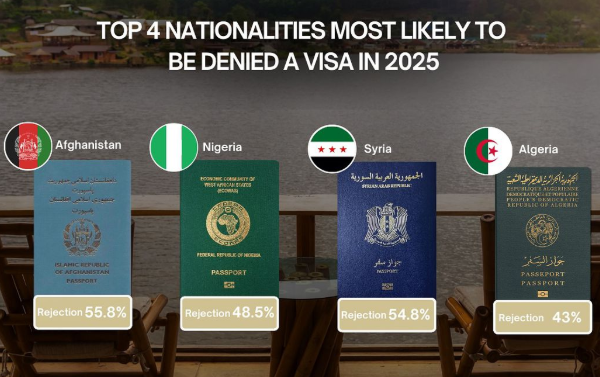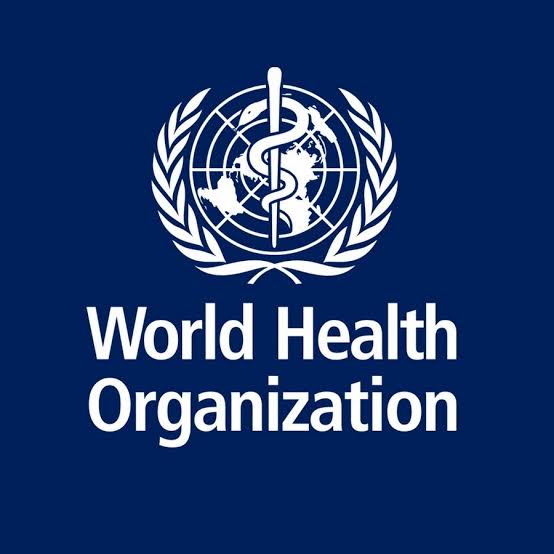Top 4 Countries Most Likely to Be Denied Visa in 2025 – Nigeria Is on the List

A recent report by Imperial Citizenship Global has revealed the top 4 countries most likely to be denied visa in 2025, spotlighting ongoing challenges in global mobility and international travel freedom. These countries: Nigeria, Afghanistan, Syria, and Algeria are expected to face the highest visa rejection rates in the coming year, due to a combination of political instability, security concerns, and negative global perception.
Visa approval is more than just a bureaucratic process; it reflects how a country's citizens are perceived in terms of trust, reliability, and international cooperation. Below is a detailed look at why these four countries top the list for likely visa denials in 2025.
1. Afghanistan – Visa Rejection Rate: 55.8%
Afghanistan leads the list, with a projected visa rejection rate of 55.8%. The country continues to face significant political and social instability under Taliban rule, with ongoing humanitarian crises driving many citizens to seek refuge abroad. Because of widespread displacement and asylum-seeking behavior, immigration authorities in many countries now view Afghan visa applications with heightened scrutiny.
Concerns about national security, lack of a stable government, and weak passport infrastructure make it increasingly difficult for Afghan nationals to obtain travel visas.
2. Syria – Visa Rejection Rate: 54.8%
Syria remains burdened by the long-term effects of civil war, displacement, and political unrest. These conditions severely limit the travel opportunities of Syrian citizens. Visa applications are often rejected due to fears related to terrorism, overstaying, and asylum claims.
Even legitimate requests for education, work, or family visits face intense vetting, as the collapse of state institutions and unreliable documentation continues to hamper Syria’s global mobility.
3. Nigeria – Visa Rejection Rate: 48.5%
Despite being Africa’s largest economy and one of its most influential nations, Nigeria ranks third on the list, with a 48.5% visa rejection rate forecasted for 2025. The report identifies complex visa application processes, excessive paperwork, and prolonged waiting times as key factors in the high rate of denials.
While Nigeria’s economic and diplomatic relevance is undeniable, immigration authorities in several countries have raised concerns about issues such as visa overstays and misconduct by some Nigerian nationals. These actions have affected the reputation of Nigerian travelers, prompting stricter review processes.
At the same time, critics argue that broad visa restrictions unfairly penalize millions of law-abiding Nigerian citizens, including students, professionals, and tourists seeking legitimate travel opportunities.
4. Algeria – Visa Rejection Rate: 43%
Algeria faces growing visa restrictions, especially when it comes to travel to European countries. With an expected visa rejection rate of 43%, many applications are denied due to concerns over illegal migration, overstaying, and informal employment abroad.
Additionally, Algeria’s strained diplomatic relationships with some European Union member states have influenced how visa applications from Algerians are evaluated, making approvals increasingly difficult to obtain.
The UK’s Stricter Visa Policy: Impact on Nigeria and Others
The United Kingdom is one of the countries tightening its immigration policy in 2025, particularly targeting nations perceived to have high overstay and asylum claim rates. Nigeria has been named alongside Pakistan and Sri Lanka in the UK’s latest immigration review.
According to recent data from the UK Home Office, over 2,800 Nigerians who entered legally under work or study visas submitted asylum claims last year, triggering concern among UK authorities. As a result, tougher screening and new visa policies are being introduced.
.png)
While these changes aim to address immigration control, experts argue they also risk harming genuine travelers, students, and professionals who contribute positively to host countries.
Addressing the Roots of Visa Rejection
The top 4 countries most likely to be denied visa in 2025 reflect deeper issues beyond paperwork. Visa rejection is often tied to political conditions, national image, and citizen behavior abroad.
For countries like Nigeria to improve global mobility, a combined effort is required: governments must strengthen diplomatic ties and immigration systems, while citizens must uphold integrity and responsibility during international travel.
Restoring global trust is not only about policy reform—it’s about shaping how the world views a nation's people. Responsible behavior, strong institutions, and diplomatic engagement are the key steps to unlocking broader travel opportunities in the future.

